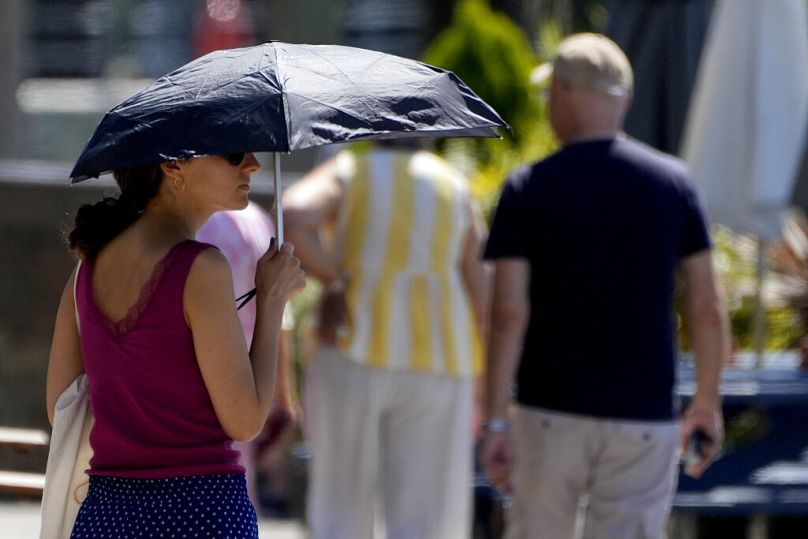More heat records are expected to be broken on Tuesday as the blazing temperatures reach further north and east.
A deadly heatwave that has demolished temperature records in continental Europe is spreading north and east on Tuesday.
 ADVERTISEMENT
ADVERTISEMENT
 ADVERTISEMENT
ADVERTISEMENT
The UK hit its highest ever temperature in recent history, with a temperature of 40.2°C recorded at Heathrow in London, and forecasters are saying it could top 42°C later today.
The highest temperature previously recorded in Britain was +38.7°C in Cambridge, a record set in 2019.
The high Tuesday came as the country sweltered in a heatwave that also scorched mainland Europe for the past week.
Germany, Belgium and the Netherlands are also boiling in extreme temperatures, while wildfires still rage in parts of southwest France and Spain
Travel, healthcare and schools were disrupted in the UK, which is not prepared for such extremes, and there are scattered reports of fires in city parks and grass areas.
For the first time, the UK authorities have issued a level 4 alert, the highest level, corresponding to a national emergency, warning that the heat is dangerous even for young or healthy people.
Check out our top guides on what to do to stay safe during the heatwave
- How to stay cool: 13 unusual ways to stave off the extreme heat
- Too hot to work? Here are your rights if you're working in these European countries during the heatwave
- Feeling anxious about how climate change? This is how you can help
What's the situation eslewhere in Europe?
In Ireland, it was +33°C degrees in Dublin on Monday, the highest temperature recorded since 1887.
Scientists say the increase in heatwaves is a direct consequence of global warming, with greenhouse gas emissions increasing their intensity, duration and frequency.
“Climate change kills,” Spanish Prime Minister Pedro Sánchez said Monday during a visit to the Extremadura region, the site of three major wildfires. “It kills people, it kills our ecosystems and biodiversity."
Spain has been in the grip of the suffocating heatwave for more than a week, with almost the entire country under an "extreme risk" fire alert, and temperature highs in many places above +40°C.
The heatwave is still impacting France on Tuesday as well, although there should be a drop in temperatures on the Atlantic coast, as the heatwave shifts to the east of the country according to Météo France.
Numerous heat records tumbled in France on Monday, with highs of +39.3°C recorded in Brest in the north-west; +42°C in Nantes in the centre-west; and +42.6°C in Biscarosse in the south-west.
Regional records in France were broken in over a dozen towns, as the weather service said Monday was “the hottest day of this heat wave.”
France's highest ever recorded temperatures was recorded on 28 June 2019 as Vérargues in the south hit +46°C.
The Netherlands recorded its hottest day of the year so far on Monday, with temperatures reaching 35.4°C in the southwestern town of Westdorpe. On Tuesday, temperatures could reach 39°C in the south and centre of the country, approaching the national record (40.7 degrees on 25 July 2019).
Belgium is fearing record highs on Tuesday, with the thermometer rising in places to 40°C, according to the Royal Meteorological Institute (RMI). Hours have been adjusted for certain jobs exposed to the heat.
The Balkans region expected the worst of the heat later this week, but has already seen sporadic wildfires in Slovenia and Croatia.
About half of the EU's territory is currently at risk of drought due to the prolonged lack of rainfall, which is putting countries such as France, Romania, Spain, Portugal and Italy at risk of reduced crop yields, according to the European Commission.











